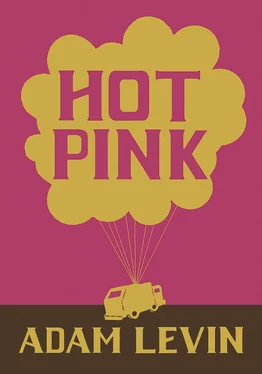The dog had vomited, warmly, onto the man, startling the man. In turning his head to examine what had startled him, the man turned the steering wheel hard. The car was traveling forty-nine miles per hour in the highway’s right lane, and he had just enough time, before it struck the pylon supporting the overpass, to brake to forty-one, which put the car into a spin, and to wonder if the gel had caused the dog to vomit, or if, as his wife would probably claim, the bacteria on the bacon was the culprit. 3
The coma seemed to last for about thirty seconds. The man had a vision of the crack oozing gel and thought of a cummy vagina, a “creampie.” That’s not what it was, though! He felt so dumb, just dumb and iniquitous to even think such a thing. It wasn’t a “creampie” at all, but a crack. A crack in the wall oozing gel is what it was, and now he noticed how the light was reversed, like a photograph’s negative: the gel a bright, pearlescent white, the crack even brighter, the wall black as onyx. He stared at the crack. It was a lovely crack, beautiful, perfect even — its width, its length, its distance from the ground. How could he have missed that? How could he ever have wished it away? What a fool he had been! The crack was a blessing! The crack was a gift! It was there for him— his crack. He knew it all at once, and in the most basic way. He knew it the way he knew he loved his dog. Now all he wanted was to tend to it lovingly, to give it a long, tender wiping — but he couldn’t. He couldn’t move his hands! He couldn’t feel his hands, much less find a tissue. He needed a tissue. All he needed was a tissue and one working hand on an arm that could reach. This poor, gorgeous crack, he thought, in need of a wipe! But wait a second, wait. He could feel his head. He could feel it inside —he could feel his mouth. His mouth was so dry. If he could feel his mouth, he could move his head!
The man sprang from his coma, sitting up straight, licking at the air. The side of his head hurt. Everything was white and beepy and glugging. He heard his wife’s voice. “Thank God,” she was saying. “Thank God, thank God.” His sight adjusted. The room he was in was small and overlit, a hospital room. His wife was huge.
“Thirsty,” he rasped.
She brought him a crinkled paper thimble of water, held it to his lips. He sipped and he swallowed. The side of his head hurt. He remembered the dog, the vomit upon him, the stab of panic just before impact.
“I missed you,” his wife said. “I missed you so bad.”
“I missed you, too. I’ve been such a fool. I was wrong about the crack.”
“Wrong?” she said.
“Yes. I was wrong. I…” He couldn’t explain. He couldn’t phrase it right, not with any dignity. His knowledge was a private kind — it wasn’t even, he now realized, knowledge. It went beyond knowledge, was better than knowledge. What it was was belief. The crack was good.
“How’s the baby?” he said.
“Still ticking,” she said, and patted her belly.
“And the dog?” he said.
“The dog?” she said. “The dog,” she said. “The dog,” she said, and she burst into tears. In came some nurses. She must have pressed that button.
They told him his coma had lasted three months, that the pain and the scars along his temple and cheek should fade with time. They told him he’d T-boned his car on the pylon. That all of the Swedish airbags had deployed. That the dog, whose mouth had been wide open — they’d found its vomit all over the car and deduced it had been in the midst of heaving when the car struck the pylon — was thrust, face-first, against the man’s head. That the thrust was so violent, its jaws snapped at impact and “opened like a book.” That nine of its teeth, sunk to the gums, were lodged inside the man’s head when they found him. That the dog, most likely, went instantly unconscious and asphyxiated on vomit. That they hoped that’s what it was; that that fate was superior to bleeding to death (a much slower way to go). And they told him the EMTs were blown away, had never, in all their careers, seen anything like it. They told him that he should be thrilled to be alive, and twice as thrilled yet, coma and head wounds notwithstanding, to be entirely intact. He was. He was thrilled. He was thrilled and he was grateful.
They wanted to keep him around for a week, but he left in three days. It wasn’t the insurance — he had the best insurance. He needed to get back home.
The crack on the wall was a mess of oozed gel that had hardened and crusted, ruptured, dripped, re-crusted, grayed. At its center, the mess protruded from the wall by as much as half an inch, and resembled, more than anything, a volcanic mountain range mapped topographically. The man knelt down on the floor before it, staring intensely, committing the features of the mess to memory; he wanted a stick to brandish at himself on the off-chance he ever grew tempted to abandon his crack-wiping duties (for a carrot, his vision from the coma would suffice).
Once he had the mess memorized, he drove the new car (same model as the old car; their coverage was excellent) to the hardware outlet, and purchased organic natural sponges and a non-abrasive solvent made with berries, milk, and mink-fat that required refrigeration. (“The Lamborghini of cleansers,” the salesperson told him. “A little blob’ll do you.”)
As per the instructions printed on the tube, he applied a dime-size gobbet of solvent to his wetted (with filtered water) sponge, and waited for the solvent to turn from green to silver. Once the color had changed, he held the sponge to the wall an inch above the crack, pressing just enough to allow a few drips, and then he made the magic happen. The entire mess of crusted, hardened gel came off with one gentle, downward stroke of the sponge, and the crack, shimmering and wet, was freed. He blotted up the moisture with a second special sponge and threw both sponges away in the garage. On his way back upstairs, he stopped in the kitchen to pick up a jelly jar. The mess had slid down the wall intact, but had broken in two — mountains and foothills — when it struck the floor. He put the two pieces inside of the jelly jar, screwed the cap tight, brought the jar to the yard, and began, with a spade, to dig a hole in which to bury it.
Through the sliding-glass door, his wife saw him digging and went outside.
“What are you doing?” she said.
“I’m burying this mess.”
“Why?” she said.
“It seems like the right thing to do,” he said.
“I think it’s strange.”
“I know,” he said. “But I don’t mind.”
“Can we talk about the crack?” she said.
“I’d rather not,” he said.
“Can I just say that I think, with the baby coming soon, I think that we should really consider trying again to replace that wall. I don’t know what that gel that comes out of it is, and I’m worried it’s doing something to you that I don’t like. And I’m worried about what it might do to me or, God forbid, the baby.”
The man stopped digging to stand and hug his wife. “The gel,” he said, “won’t do anything at all to you or to the baby. I would never let that happen. I won’t let it happen. I will tend to the crack every morning. The wall stays.”
“You’re insisting.”
“I’ll put my foot down if I have to. Do I have to put my foot down?”
“No,” his wife said. “You don’t have to put your foot down.”
He raised a leg high and slammed his foot down on the patio. Then he did it again. His wife laughed, kissed his cheek, and went back inside to watch TV. He joined her once the burial of the jar was complete.
But for one brief moment, the man spent the rest of his life feeling ebullient. The crack oozed gel, he wiped the crack, threw the kleenex away, his teeth were clean, his home was lovely, he backed his car in, he thrived at his job, his coverage was solid. His child was born, the child was cute, the child was healthy, his wife was healthy, they had another child, who was also cute and healthy, his investments matured well, and, after the second child started grade school, his wife sold real estate and thrived at her job, and by the time that he and his wife retired, his children were wealthy, and they had their own children, and the man died smiling in the middle of a dream, and his wife collected millions of dollars in insurance, wiped the crack in his stead, bought higher education and condos for the grandkids, lived mostly in her memories, nearly all of which were good, and then she died, too, in her sleep. In the months before her death, she’d had the house remodeled, but she’d let be the wall with the crack in the bedroom, and in her will’s only codicil, she made it clear to all her progeny that if her youngest grandchild, to whom she’d left the house, were to alter the wall in any way or fail to wipe the crack with a kleenex as needed (as the years marched on, the gel emerged less frequently), the house would go to her eldest grandchild, whom the youngest despised, and the youngest did nothing to alter the wall, and he tended to the gel on the crack as needed, and he continues to do so till this very day.
Читать дальше











